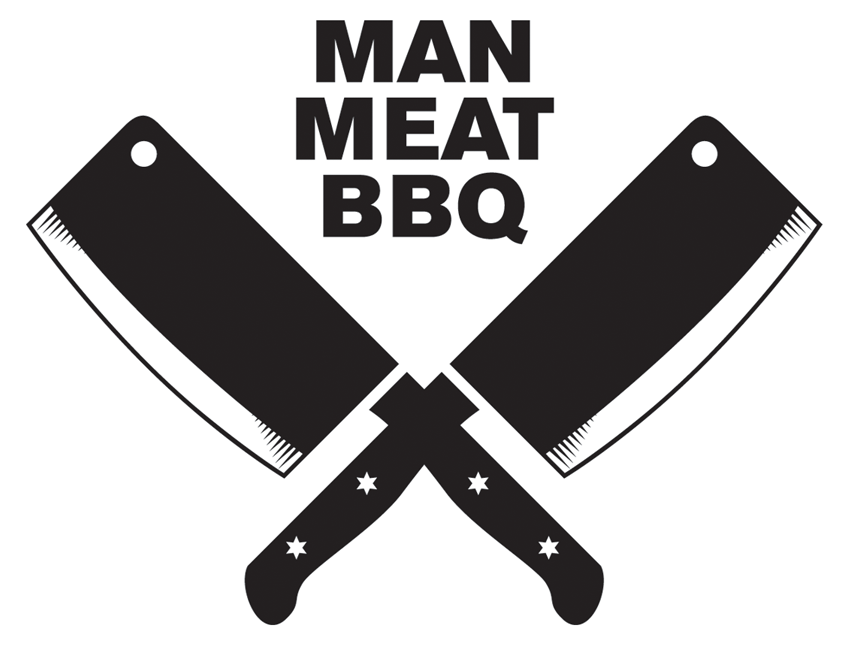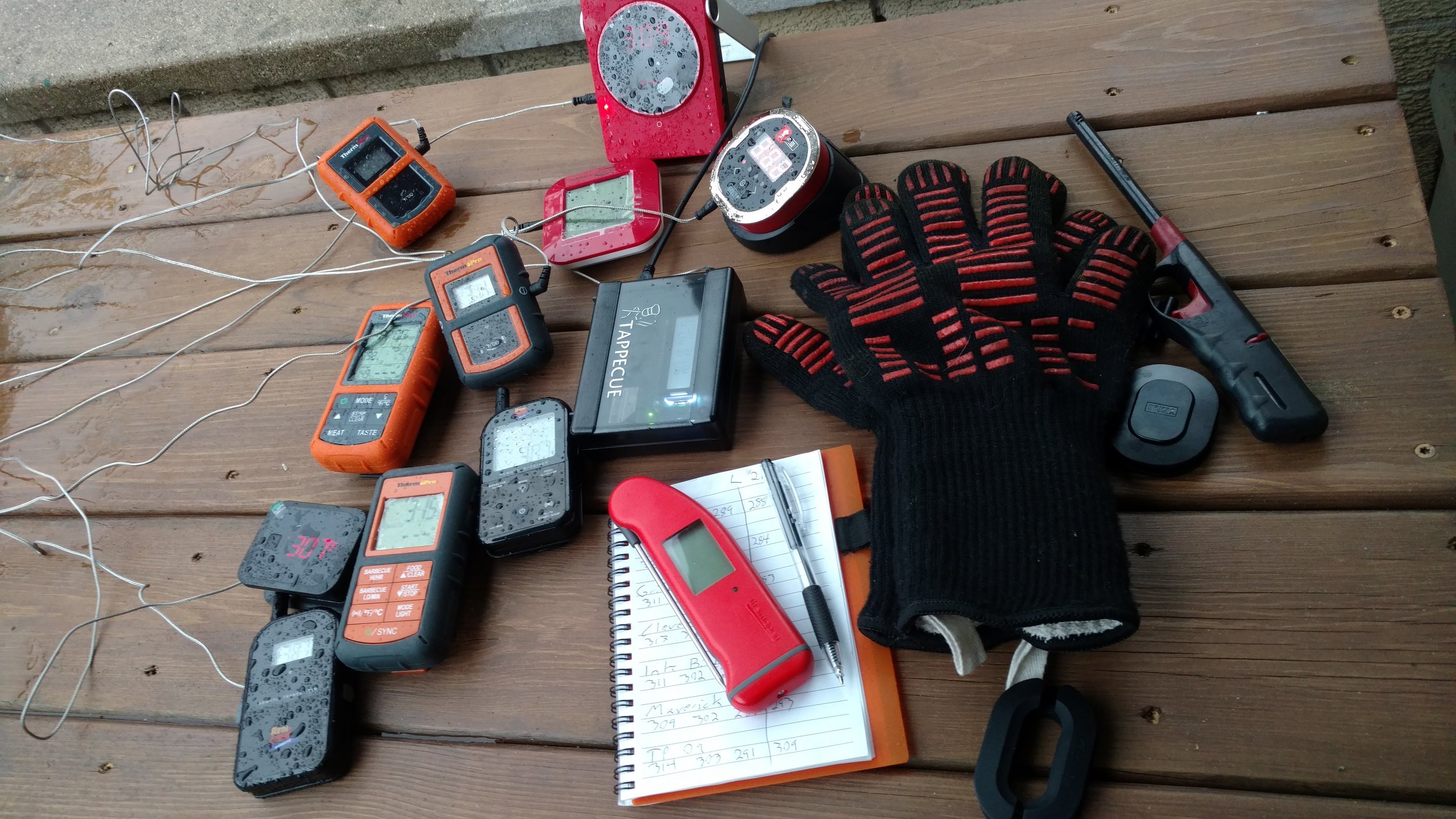When I started this blog and barbecue for the first time, there was one tool which was imperative to my success superseded by only my cooker itself, the thermometer. Yes, BBQ is first and foremost about passion and food, but, the thermometer is indispensable when it comes to cooking things right. Sure, you can all say one needs to cook by feel, but that comes only with time and practice. The thermometer is your safety net. It lets you know when your heat is right, or when it is wrong. It gives you a direct view to what is taking place in the cooker.
With that being said, there are countless options available when it comes to taking the temperature. The thermometer is an investment which you shouldn't have to make over and over. You should be able to buy the right one for you and forget about worrying. So which thermometer is best? This is the very question I wanted to answer.
In theory, this sounded simple. Take a sampling of thermometers, and subject them to several real-world tests. See which one performs best. While I did this, I found that for the most part, there is no clear victor. To say one was undoubtedly the best would be no different than me saying cooking on a Weber kettle is best. For some, it really is, for others though there are plenty of different cookers which are best for them.
Let's start off with the logistics here. I tested 10 thermometers of different brands and styles. Everything from the instant-read probes, to Bluetooth enabled, to Wifi. Each one I tested for accuracy with both a boil test and an ice water plunge. All leave-in thermometers were tested on a 3-hr. cook with varying temperatures for consistency. Finally, all remote read thermometers were tested for range and lag.
Now, let's introduce the players:
INSTANT READ
- iTronics ThermoPro - TP-03 - Digital Instant-Read Thermometer
- ThermoWorks Thermapen MK4
DIGITAL MEAT THERMOMETERS
- The Clever Life Company - Great Digital Meat Thermometer
WIRELESS THERMOMETERS
BLUETOOTH
- Weber - iGrill 2
- GrillEye - Smart Device
- InkBird - IBT-2X
RF
- iTronics ThermoPro - TP-08 - Digital Wireless Thermometer
- iTronics ThermoPro - TP-20 - Digital Wireless Thermometer
- Maverick - ET-732 - Wireless Barbecue Thermometer
Wifi
- Tappecue - V2.0 4 Probe Wifi BBQ Thermometer
Now for the testing. Overall, every thermometer did its job. At the end of the day there were no failures and if this was simply a task of ensuring that each would indeed take a respectively accurate temperature, they all passed. But there is more to the story. So let's talk about accuracy for a minute.
For accuracy, I am leaning specifically on the boil test and the ice plunge. These are simple tests where we know exactly what the result should be. For the boil, the temp will be 212 no matter what the thermometer says and for the ice plunge, it will be 32. I tested this using 2 metrics, first accuracy of temperature, second the time it took to get to temp.
For the instant reads, this was interesting. Here, I had a $100 gold standard thermometer relied on by everyone, the Thermopen MK4 and compared it to a $10 model by ThermoPro. The results were telling. While both ended with an accurate temperature, the MK4 delivered that temp in 8 seconds, while the ThermoPro took over 30 seconds to get the correct read. Again both take an accurate temp, but 30 seconds for a read is using the term "instant read" very liberally.
For the remote read thermometers, I was far more concerned with accuracy than speed as these are not used in an instant-read method. I did, however, use the one-minute mark as a cut-off. If they can't get temp by that point, I am not going to wait for it.
With this test, there were some variances. All were within a degree or two of accuracy which I vote as a win. The only outlier was the GrillEye, which in the boil took 48 seconds to hit 208. This was still within 5 degrees, and maybe if I waited longer I could have hit 212. Either way, for most backyard grillers it works. Again, these are designed not to take an instant-read but monitor over a long period of time, so there is certainly some leniency when looking at how quickly they react to a massive temp change.
Now let's see how the remote reads do when it comes to providing a consistent and accurate read. For this, I set up my cooker for a 3-hour cook with each thermometer set up on the indirect heat side. I monitored every temp at each 15-minute interval. I also included some temp changes on the cooker to see if they would react consistently. Finally, for a bit of fun, I also took the reading from the dome thermometer built into my Weber.
This test is tricky, to say the least. First off, unlike the boil test, we don't know exactly what the temp is. Secondly, while all of the probes were in close proximity and all on the indirect side of the grill, they are in fact in different positions meaning the temp where the first probe is could, in fact, be different than the temp where the last probe is. So how do we judge it?
Well, we break out our college statistics book. The cliff notes on this test are simply this: we took an average of each temp retrieved at each time interval. Then we calculated the standard deviation. Ultimately the standard deviation acts as a threshold of how far an individual temp should vary from the average. From there we see how many stayed within that deviation and how much varied beyond that threshold.
So let's first look at the temps on the chart. As you can see, while there are variances, every thermometer stayed within range (except for the dome thermometer which I will talk about later). This is good. At the very least if you buy any of these, you are getting something which does the job you expect it to.
Now let's get to those variances. If you look at the chart below, it will show each thermometer and when it stayed within the acceptable variance, and when it didn't. Furthermore, you can see just how far it dipped out. While this data is certainly compelling, again there is not a black and white pass or fail on this. This is just another piece to the puzzle.
Now for the last piece, I want to address the range of the remote read thermometers. This is less based on the individual unit, as it is the technology it uses. So rather than call out any particular model I will just address the technology.
Let's start with Bluetooth. It is cool, it is trendy and it seamlessly integrates with your phone. Every Bluetooth model I tested responded very alike. Next, to your cooker, it is a beautiful thing. Hanging out in your backyard, it is great. Now put a wall between your cooker and you and we start falling apart. Personally, I love the Bluetooth, but for me the signal cuts in my kitchen. That is a problem. I don't want to step away from food prep to reconnect and get my temps. Then I might as well walk over to the cooker.
Now we get to the RF models. These have an awesome range. To that point, I was actually able to walk 3 houses down from mine and still get a signal. Even better, I could start a cook, set the temp alerts and go to sleep in my bedroom. The downfall of these models is they require a receiver unit. So rather than just carrying my phone, I also need to carry the receiver.
Finally, we have WiFi. Now, this is really the best of both worlds plus. You connect it to your WiFi network. You go back to using an app on your phone to monitor. But being that you are using your phone, as long as you have a connection to the internet in any way, you can get your temps. You can pick up an ingredient from the store you forgot, and check your temps. It just simply works.
Okay now let's try to pull all of this information together. Again, nothing outright failed. So I cannot just say this one thermometer is the one YOU need to buy. It really comes down to what do YOU expect from a thermometer, beyond a temperature reading. So let me help you figure that out by giving you the questions you should be asking yourself....
How many probes do I need?
Do I need ambient cooker temp or just meat temp?
Do you cook by feel and just need something to give an accurate read to back you up?
Do you want to monitor temps remotely, or are you fine with walking up to the cooker?
There are a hundred more questions you could ask and they are all about how you cook.
One last thing you need to consider in making a purchase like this is the features. Beyond taking temp and range, not every thermometer is created equal. Read the fine print. For example, some thermometer probes are only good to 487 degrees. Sure you are not smoking meat at that temp, but let's be honest...you can screw up and get the temp higher than that. Another feature is temperature presets. A lot of thermometers give you temp ranges for all sorts of cooks preset. These are great but can also be a hindrance if you just know what temps you want regardless of the presets. Finally, what type of alerts do you want? If you are using this only to take the temperature of your meat you only need an alert for temp hitting your range. However, if you plan on using it for monitoring cooker temp, you might want something that alerts you when the temp rises to your threshold or falls below a separate threshold. For these elements, you have to read the fine print.
Well friends, there you have the hard data for this review. That itself is some great information. But, while I am going to leave you with that now, it is certainly not the end of this review. I know, I know...everyone hates a cliffhanger. But do not worry because in the next installment of the blog I will take this data, along with my personal experience with each of these thermometers and give you my honest take on them.
But, while we're gone here, take a minute to share your story. What thermometer have you used? What have you looked at and why? Man Meat BBQ has an awesome new Facebook Group which gives us the perfect spot to share our stories and experiences. Drop by and let me know what you think!










